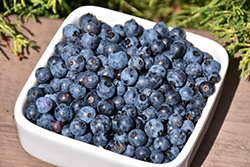It's all about ...
plants

Velvet-leaved Blueberry
Vaccinium myrtilloides
Height: 20 inches
Spread: 4 feet
Sunlight:
![]()
![]()
Hardiness Zone: 3a
Other Names: Velvet Leaf Blueberry, Velvetleaf Huckleberry
Description:
A hardy native blueberry with a low, spreading habit; produces tasty, very sweet blue fruit in mid summer; bright green foliage has velvety hairs underneath; prefers acidic soils, excellent drainage and a good mulch, plant with plenty of peat moss
Edible Qualities
Velvet-leaved Blueberry is a small shrub that is typically grown for its edible qualities. It produces small clusters of navy blue round berries with powder blue overtones which are usually ready for picking in mid summer. The berries have a sweet taste and a juicy texture.
The berries are most often used in the following ways:
- Fresh Eating
- Cooking
- Baking
- Preserves
Features & Attributes
Velvet-leaved Blueberry features dainty clusters of white bell-shaped flowers hanging below the branches from mid to late spring, which emerge from distinctive pink flower buds. It has light green foliage with grayish green undersides. The fuzzy oval leaves turn outstanding shades of orange and in the fall. It features an abundance of magnificent navy blue berries with powder blue overtones in mid summer.
This is a multi-stemmed deciduous shrub with a spreading, ground-hugging habit of growth. Its relatively fine texture sets it apart from other landscape plants with less refined foliage. This plant will require occasional maintenance and upkeep, and usually looks its best without pruning, although it will tolerate pruning. It is a good choice for attracting birds and squirrels to your yard. Gardeners should be aware of the following characteristic(s) that may warrant special consideration;
- Spreading
Aside from its primary use as an edible, Velvet-leaved Blueberry is sutiable for the following landscape applications;
- Mass Planting
- General Garden Use
- Groundcover
- Naturalizing And Woodland Gardens
- Orchard/Edible Landscaping
Planting & Growing
Velvet-leaved Blueberry will grow to be about 20 inches tall at maturity, with a spread of 4 feet. It tends to be a little leggy, with a typical clearance of 1 foot from the ground. It grows at a fast rate, and under ideal conditions can be expected to live for approximately 20 years. This is a self-pollinating variety, so it doesn't require a second plant nearby to set fruit.
This shrub is typically grown in a designated area of the yard because of its mature size and spread. It does best in full sun to partial shade. It does best in average to evenly moist conditions, but will not tolerate standing water. It is very fussy about its soil conditions and must have sandy, acidic soils to ensure success, and is subject to chlorosis (yellowing) of the foliage in alkaline soils. It is quite intolerant of urban pollution, therefore inner city or urban streetside plantings are best avoided, and will benefit from being planted in a relatively sheltered location. Consider applying a thick mulch around the root zone in winter to protect it in exposed locations or colder microclimates. This species is native to parts of North America..
